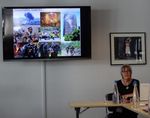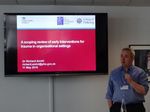Reflections on the EFPA Crisis Disaster and Trauma Meeting London 11-12 May 2018
←
→
Page content transcription
If your browser does not render page correctly, please read the page content below
Reflections on the EFPA Crisis Disaster and Trauma Meeting London 11-12 May 2018 The BPS had the privilege of hosting the European Semester of Psychology from January to June 2018. One of the events involved inviting the Standing Committee for Crisis, Disaster and Trauma to hold their bi-annual meeting at the London Offices of the BPS. The European Federation for Psychologists’ Associations (EFPA) formed a Task Force in 2001 to address crises, trauma and disasters, and this task force became a Standing Committee in 2005. In addition to making recommendations concerning the psychological input to disaster planning and disaster response, this committee also considers the Quality Standards for Psychological Interventions in Disaster and Crisis. The Standing Committee recognises that psychology as a science and as an applied profession has a great deal to contribute to this field. At the same time, it recognises that much of the delivery of services to those affected directly and indirectly by disasters will be by other professionals and lay people involved in Non-Governmental Organizations. The role of psychology is both to provide direct services based on sound psychological principles and sound evidence base, as well as to provide good quality training to these other groups. The current uncertainty brought about by Brexit will not affect the work of the Standing Committee who are committed to showing how psychology can improve our responses to our preparations for responding to crisis and disasters and for providing effective interventions for people suffering from trauma related conditions.
The meeting was in two parts, firstly there was a morning symposium which was organised by Noreen Tehrani, the UK representative of the BPS this was followed by the full EFPA meeting which was chaired by Magda Rooze from the Netherlands. The Symposia covered four areas which have been of importance the Crisis, Disaster and Trauma section: Safeguarding Children, Psychological Screening and Duty of Care, Dealing with Disasters and Early Interventions. Professor Richard Wortley from the Jill Dando Institute of Security and Crime Science presented with Steve Reeves of Save the Children. Richard delivered an extremely powerful presentation which looked at the nature of child abuse and of the abusers. Steve talked about the issues of child abuse and the implications in humanitarian organisations The members of the EFPA standing committee were shocked to hear of the magnitude of child abuse and confirmed the importance of working with a wide range of psycyhologists from different disciplines to ensure that they are fully informed on the potential risks and dangers. A challenge was thrown to psychologists by Steve Reeves for psychologists to offer support to humanitarian organisations to provide improved systems and support for their workers and recipients of aid. The second presentations were on the role of psychological screening in organisations, with presentations from Elizabeth Eades, Head of Occupational Health in Surrey Police and Noreen Tehrani who works in organisations to support employees at a high risk of developing trama related conditions. This presentation showed how by introducing regular screening for officers and staff in high risk roles it is possible to be proactive in providing advice to organisations on the kinds of interventions that are effective in improving resilience and to proactively identify workers who may be struggling before they become unwell. The third presentation was on dealing with disasters with Sarah Davidson, a psychologist working with the Red Cross with a responsibility for psychosocial support and Louise Pye who has worked as a Family Liaison Officer for several major disasters including the Shoreham Air Crash and Grenfell. Sarah and Lou were able to demonstrate to the EFPA members the issues that face emergency services and humanitarian organisations when dealing with a major disaster. The issues described were also familiar to all the European representatives who felt that more should be done in Europe to improve the standard of Disaster Preparedness and Support.
The final presentations were on establishing which early interventions are effective. This is an area where there has been some controversy which has been increased by the publishing of the draft NICE guidelines which many believe fails to address this area of early post-trauma care adequately. This presentation was given by Richard Amlot a psychologist who leads the Emergency Response team in Public Health England and Ian Hesketh the lead for wellbeing in the College of Policing. Richard and Ian talked about the project that the College of Policing has commissioned for Public Health England to undertake a scoping of early interventions which would provide some evidence based guidance on the best way for organisations and services to provide support for employees and others during the first month following a trauamtic exposure. The European members were very interested in this development and keen to ensure that the findings of the project would be fed back to the Standing Committee to help inform psychologists throughout Europe on the most appropriate intervetions and approaches to be used in supporting those that are affected by trauma.
The main meeting took place in the afternoon of 11 May and on 12 May. The agenda covered a wide range of issues
including:
Recommendations for education and training of psychologists working with crisis and disasters
The psychosocial issues for psychologists in dealing with crowd behaviour
The EFPA Crisis Disaster and Trauma workplan for 2018
A discussion of the mornings Symposia
Radicalisation
The needs of unaccompanied refugee minors
Psychosocial needs of refugees
The role of the Standing Committee
Training for the lower resources countries in Europe
Review of EFPA projects and products
The UK representative came away with three projects:
Looking at the possibility of setting up a Disaster Resource Network of volunteer psychologists available to
provide support post disaster
Undertaking a survey of European members to establish the nature and level of preparation and support
available for dealing with crisis and disasters
Working with Save the Children UK to identify how psychologists could provide input and support for
humanitarians.Of course, the meeting was not totally dominated by trauma, there were lighter moments. The Dinner at the Royal Exchange – a real treat funded by the BPS was a great time to relax and get to know the other members of the group better And there were also those who were leaving the group to be honoured. Bill Yule had left a year previously and this was the last meeting for Anders Korsgaard, the member for Denmark. The EFPA Crisis, Disaster and Trauma Standing Committee would like to thank the BPS for hosting the Semester of Psychology and for supporting our meeting in London. There are many memories to take away from the two days as well as a greater determination to work together as Europeans determined to work for better understanding in how as a continent we can deal with Crisis, Disasters and Trauma more effectively. Noreen Tehrani Crisis, Disaster and Trauma Representative EFPA Standing Committee
You can also read


























































